Skyhunter Read online
Page 3
The footsteps enter the hall. From the corner of my eyes, I catch sight of a pair of black boots, polished to perfection, and the sweep of a pale coat against pant legs.
I remember the color of that coat. Corian’s father has come to greet me.
I swallow hard. I don’t know how to apologize for the death of his son. Cannot tell him my deep shame at being unable to protect his favorite child. I can do nothing except remain in this position, holding out Corian’s uniform. So that is exactly what I do. I remain perfectly still, waiting for the man to say something.
The boots stop right in front of me. I can feel the heaviness in the air of his father’s looming presence.
Tradition usually dictates that, when a Striker delivers his fallen Shield’s uniform to his family, the family responds by accepting the uniform with both hands. As Shields are bonded to each other like siblings, the family should then embrace the Shield as if he or she were also their kin.
But long moments pass. I wait. Corian’s uniform stays heavy in my hands, untouched, and his father’s boots remain leaden before me.
Then his voice echoes above me in a low, rumbling growl. “Do you know why my son chose you as his Shield?” Master Barra says.
I don’t dare look up. I can barely manage a shake of my head.
“Because Corian had a bleeding heart,” his father continues. “He felt sorry for you, little Basean girl, always crouched like an animal outside the arena. I told him not to choose you. You weren’t good enough. He did anyway.” His voice turns grating, harsh and cold with grief. “That’s why my boy is dead. Because he selected a rat to protect him.”
I see the man’s boots turn away and point in the direction he’d come. His voice snarls above me with disgust.
“Keep his uniform,” he says. “It’s already been dirtied by the hands that allowed him to die. This House does not accept trash as an offering.”
Then the voice stops, and the boots walk away, leaving me kneeling on the floor. He did not bother dismissing me. Without his permission, I am obligated to stay here.
Families simply do not refuse the uniforms of their fallen children. I hesitate, confused, unsure in the moment what to do. My arms shake from the effort of staying still. My eyes point down at the floor. The wood pattern breaks at the edge of each plank. All I can do is repeat his words, which are spinning through my mind.
He felt sorry for you. This House does not accept trash.
I stare down at my hands and arms and think of Corian’s last moments. I see his bright blue eyes pleading for me to end his life before it is too late. Trash. I know, logically, that I am not. But it doesn’t matter.
I had let Corian die. I’d killed him because I never belonged in the Strikers. My Shield’s blood will forever taint my fingers.
I have no idea how long I kneel here. No one else comes to greet me. No one takes Corian’s uniform from my outstretched hands. No one wants to accept the apology I have come bearing. The House of Barra will make sure I alone carry the weight of Corian’s death.
The light disappears from the room and is replaced by evening. I will myself to stay trembling in place. Waiting. Hoping.
I don’t know whether I make it to dawn or not. All I remember is waking up with my cheek pressed against the cold floor. A servant is quietly shaking my shoulders.
“You need to leave, now,” he whispers to me. I look up into the grave eyes of a young servant boy nervously wringing his hands. His eyes dart to the hall behind us as he holds a hand out toward the door. “The guards will show you out if you don’t go yourself.”
In desperate shame, I hold the uniform out to him, as if even a lowly servant of the House of Barra accepting my offering would be better than nothing. But the boy shrinks away, not daring to touch it. He gives me an apologetic stare, then straightens and leaves me.
I wait a moment longer before I slowly pick myself off the floor. Corian’s uniform stays clutched in my hands. My breaths come in slow, shallow gasps as I think about what comes next.
I have lost my Shield, my closest friend. But there is more to lose. If Corian’s House refuses to accept my apology, then my standing as a Striker is threatened. They will appeal to the Firstblade to release me from the forces, say I’m unfit to be entrusted with the life of another, unfit to protect this nation. Corian was the only reason I’d been allowed to become a Striker. Without him, I’m left unprotected. And without my aid, so is my mother.
If the House of Barra does not accept me, then I may have just seen my last days as a Striker.
3
I’m dreaming again. In the dream, I’m twelve, and Corian is there.
I’m crouched in the shadows of the back gate leading into the Strikers’ training arena, a vast amphitheater in the heart of Newage’s Inner City. From here, I can see the apprentices practicing their attack formations, their sapphire coats spinning in lethal unison. It is always like watching a dance, and I’m hypnotized.
I’m not the only one in Mara who loves to watch the Strikers train.
I look down at my own clothes. They’re ragged. Even my patched elbows are worn so thin that the cloth seems translucent. Hunger claws at the base of my ribs. Sometimes, I think I longed to become a Striker only because I knew their apprentices got living quarters, three meals a day, and a healthy weekly pay. So I’d fantasize about having all of that, giving my mother the safety of a home of her own. I’d sneak into the Inner City to watch them train at the arena. Now my gaze stays fixed on the youngest recruits as they face off against one another. They’re all around my age, some a little older. Soon, each will be paired with someone who best complements their personality and fighting ability.
When you can’t speak, you spend a lot of time watching. Parsing. Listening. This, at least, I do well, so I analyze the forms of the students and take mental notes on how they keep their footing. From the scrapyards dotting the Outer City, I’d learned how to shift my weight in my favor. I knew how to climb up haphazardly stacked metal ruins discarded in the yards, leftovers from the Early Ones dug up by farmers and builders. I could weasel my way inside some ancient engine to strip it of parts, then leap from one stack to another if it teetered. I could dance on unstable sheets of steel, using a blowtorch my mother had bought to sever the valuable pieces to sell. I knew how to twist between the wreckage to hide from bigger kids that vied for the yards with the best metals.
As I watch the apprentices, I mimic their steps, and my movements rise and fall in near-perfect sync with them. A grin lingers on my lips as the exercise warms my limbs. I lose myself in the concentration, until I can believe that the rags streaming behind my limbs are no different from their sapphire coats.
I don’t remember how long I stay there in the darkness, going through the motions. All I know is that I’m in midair when a young voice calls out to me from above the back gate’s entrance.
“You’re really good, you know that?”
The voice throws me off balance. I land awkwardly and fall with a thud, sending up a cloud of dirt. My head jerks up.
There, leaning idly over the top of the gate, is a boy with bright golden hair and a thoughtful tilt to his head. Even in a dream, his features are so clearly defined that it’s as if I were looking at him through a magnifying glass. His clothes are finely spun, and rings glitter on his fingers. He’s confident, his shoulders straight and chin raised. A highborn Maran.
My grin vanishes. My mother had warned me about rich boys.
“You’ve been out here every day for months,” he tells me. It is a voice that has never hesitated before.
Panic lodges in my throat. I scramble to my feet and immediately start running.
“Hey!” he shouts at me, but I don’t dare turn back. Refugees aren’t allowed inside the Inner City without a permit. If they catch me, what will they do? I’ve witnessed a woman shot in the head for trying to sneak past the wall guards. I’ve seen a refugee whipped to death for attempting to sell bushels of seaweed wi
thout a license at the Inner City’s night exchange.
I don’t stop to dwell on it. I just keep going.
Suddenly a force tackles me from behind. Before I know it, I’m facedown on the ground, and the boy’s voice is hovering over my head. I flip instinctively. He goes flying off me as I scramble into a crouch, my fists up.
He laughs, shaking dust out of his hair. All I can think about is how little he cares that he’s dirtied his fine clothes. I try to still my trembling hands. What kind of punishment will this mean for me?
“You’ve obviously never fought anyone in your life,” he says with a smile. “But I’ve been watching you. Your reaction time is incredible.”
When I flush, he offers to help me up. I stare at his outstretched hand, trying to figure out whether he’s serious or about to play a prank on me. Then, tentatively, I put my hand in his. He yanks me to my feet in a single motion, as if he’s been waiting to pull me up all his life. “I’m Corian,” he adds.
I don’t answer.
He frowns at me. “Well?” he asks. “And your name is?”
I pat my throat twice and sign to him. “I’m Talin. I can’t speak.”
I don’t expect him to understand what I said. But his eyes widen—and then he smiles and signs back. “Good. All Striker apprentices must learn how to sign,” he answers. “You know that, right?”
I remember everything about that moment—the movement of his hands through the air, the easy way he took in my soundless words, the kind smile on his face. I knew that Ghosts on the warfront had powerful hearing, but I didn’t know that Strikers used sign language to communicate out there. My lips twitch with a grin. He’d understood me. He understands me.
“They use the same signs that I do?”
“Very close. You’ll pick it up in no time.” I notice some of the differences now, like how some gestures are simplified, while others are more elaborate.
“So you want to be a Striker?” he asks.
I shrug, unsure what I’m allowed to say. “Doesn’t everyone?”
“I’m surprised a Basean would want to defend us,” he says, and now his face is grave. “Mara doesn’t treat your kind that well.”
I pause in surprise—a highborn Maran has never even laid eyes on me, much less paid such close attention to me. Much less sounded sympathetic to Baseans.
“We still all have the same enemy,” I reply. “Mara isn’t the Federation.”
He considers me seriously. “Why don’t you try out for the apprenticeship, then?” he asks.
“Baseans aren’t allowed to.”
“So? You move as fast as anyone inside that arena.” He nods over his shoulder. “You should at least come to the exams. I’ll put in a word for you with the Firstblade, if you’re interested.”
When I just stand there, stunned, he puts his hands in his pockets and turns away. I envy the straightness of his back, the wild confidence in every line of his figure. He really believes his words can carry that kind of power. It makes me think he must be right.
In that moment, I make a vow to be like him. I’m going to find a way to walk through life with courage seared into my bones.
“No pressure, of course,” he calls over his shoulder as he turns in the direction of the arena. “I just thought I’d suggest it.”
The sun is warm, the sky a cloudless blue. My heart beats rapidly against my ribs. I wait a breath longer. Then my legs finally loosen, and I find myself doing what I would do for the next six years—I follow him. I run and run and run.
But in my dream, I never catch up.
* * *
A knock against my door jerks me awake. My face is still streaked with tears.
I swing my legs over the side of my bed. Weak morning light bands across my arms. My head throbs in a rhythm, aching from nightmares I can’t remember. It takes me a second to register that I’m back in my Striker apartment in Newage, and another to remind myself that I now live here alone. My hand goes instinctively to the black bits of Ghost bone studding my ears. The piercings are still fresh enough to hurt when I touch them.
It’s been two weeks since I tried to deliver Corian’s uniform. I wonder if I will ever stop dreaming about him. The shadows are haunted by echoes of where he used to be. Across the hall is his room, the door closed. I haven’t looked in there since I hung his uniform back in his closet. There’s no need to see his bed, tidy and unused. His dressers empty and weapons cabinet hollow. I can feel his emptiness in the air around me, and the reminder every morning sends such a sharp pain through my chest that I want to curl back into my bed and drift off into oblivion, to lie here and never wake, to stay and stay until death comes to claim me too.
Corian would scoff at me if he saw me like this. He’d roll me right out of bed and toss my coat at my head. The thought of his exasperated glare is almost enough to make me laugh through my grief.
Corian, I think. When you first met me, did you see someone with potential? Or is your father right? Did you really just feel sorry for me?
What does it matter, anyway? No new Striker wishes to pair with me. The Firstblade is debating what to do. Soon, I have no doubt, he’ll kick me off the patrols. Then I’ll be forced to stand by, as helpless as the day my mother and I fled our home, as the Federation comes marching through the gates of Newage.
The pounding against my door starts up again.
Walk with courage, I remind myself, thinking of the vow I’d once made to be more like Corian. I sigh, force myself to push up from the bed, and reach for my shirt.
When I finally answer the door, I see Adena Min Ghanna from my patrol standing there in her uniform, her smile so big that it looks like it hurts. Her frizzy hair is tied up into a neat bun, and the morning sun gives her dark skin a warm highlight. She adjusts a pair of goggles on her forehead and wrinkles her nose at me.
“You look like hell,” Adena scolds. She reaches down to brush a few strands of hair away from my eyes, then tugs once on the bottom of my shirt, which I’d left carelessly loose. “Tuck it in, you heathen.”
“I thought Marans didn’t have an official religion,” I sign, my mood turning me sarcastic.
“It’s a saying, Talin,” she signs back.
“Why do you look like you swallowed a frog?”
“All Strikers are to gather in the arena this morning.”
I squint up at the sky, my gaze settling on the bands of distant clouds. “For what? Is the cease-fire over already?”
Adena shakes her head. “No. We caught a deserter from the Federation.” She leans forward eagerly. “He’s to be interrogated today, before an audience.”
A prisoner of war. Now I remember Corian mentioning someone being seized during the same sweep when he’d died. This must be the soldier.
My heart hardens. By tradition, the Firstblade of the Strikers is the one responsible for interrogating enemy soldiers we capture. He questions them in public at the arena, often by stone or by whip, until they tell us what they know about the Federation. If they don’t cooperate, they are executed before an audience.
It sounds cruel, torturing a prisoner to death. But sometimes cruelty is catharsis. I’ve witnessed firsthand what Federation soldiers can do to the people they conquer. To women. To families. To children. This public death is a kindness in comparison, a pitiful fragment of justice for all of us who have lost loved ones in the most horrific ways.
“You made me get out of bed just because we’re executing some Federation coward today?”
“Is arguing with me your new habit?” Adena responds.
I hold my hands up innocently before replying, “Just asking questions.”
“Firstblade’s orders. Strikers to the arena. So stop playing around and go put on your full gear.”
Adena had been close with Corian too, but the way she copes with his death is to drown herself behind her meticulous habits, nitpicking everything as if she could organize the grief out of her system. She’s stopped by my apartment every day f
or the past two weeks, bringing me savory pancakes and meat pies wrapped in cloth from the cafeteria, checking to see if I’m sleeping and putting on clean clothes.
I hate myself a little for forgetting that others are also learning how to move on from Corian’s death, that Adena is the more considerate one of us, that she knows to think of me even as she struggles.
I haven’t lost my Striker uniform just yet. And watching the execution of a Federation soldier might at least distract me from my haze of grief. I bow my head to Adena and start to turn away. “I’ll be quick,” I promise her.
Adena waits in the open doorway while I wash my face and strap on my harnesses and weapons. A few minutes later, I emerge in my full uniform, and together we head out of the Striker quarters in the direction of the training arena.
Everywhere, there are signs of strain from years of war. The streets are cracked and in desperate need of repair. People buying food in the exchange market clutch ration cards for seaflour, while auctions run high for cuts of beef from the limited numbers of wild cows we’re allowed to cull for the month. When a string of children run past us, I notice their bony arms, the too-sharp jut of their chins.
The conditions are even worse beyond the walls, in the Outer City’s shanties. Every time we head to the warfront, we ride through their narrow mud paths, lined on either side by shacks made of rusting tin sheets and threadbare cloth. Hollow-eyed refugees from Kente, who brought their famed metalworking skills here to help us build our walls and weapons. Merchants from Larc, whose reams of fabric and bags of colorful spices are popular with Marans. Baseans, whose agricultural skills and hardy crop seeds have helped in harvesting the land more efficiently.
Basean refugees are the most difficult for me to see. Their eyes always light up at me, as if the fact that I’m one of them means that I can somehow save their families.
But I can’t remember the last time we didn’t have a food shortage. Mara’s ruin-dotted cliffs and mountain ranges have served as a natural advantage for us in the war—but in the end, they may be what kills us. The only crop that Mara harvests is camifera, a leathery, nutrient-rich plant that thrives on the wet cliffs fed by salty waves. Originally an invasive species that leached the damp soils of nutrients, camifera could be pounded into a flour for breads and noodles or woven into a coarse fabric called seasilk, we learned.

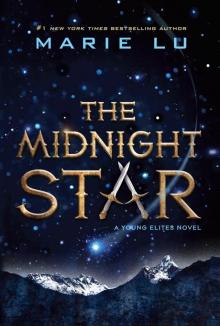 The Midnight Star
The Midnight Star Legend
Legend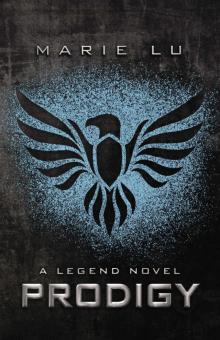 Prodigy
Prodigy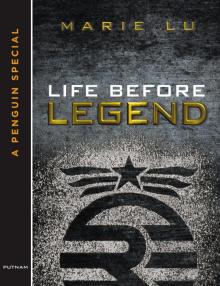 Life Before Legend
Life Before Legend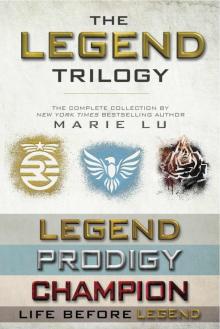 Legend Trilogy Boxed Set
Legend Trilogy Boxed Set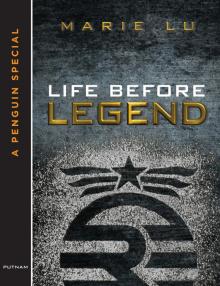 Life Before Legend: Stories of the Criminal and the Prodigy
Life Before Legend: Stories of the Criminal and the Prodigy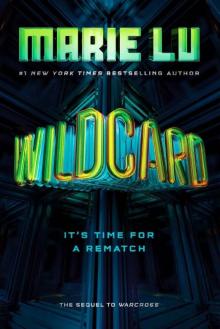 Wildcard
Wildcard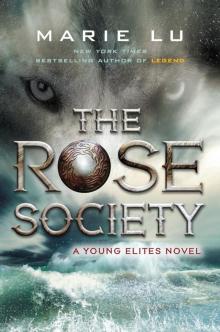 The Rose Society
The Rose Society Warcross
Warcross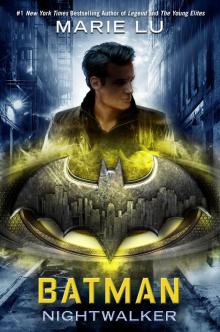 Batman: Nightwalker
Batman: Nightwalker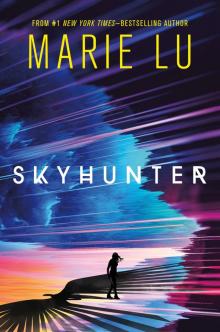 Skyhunter
Skyhunter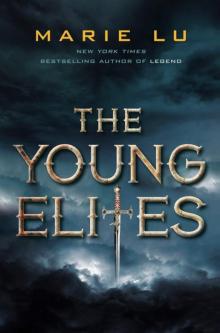 The Young Elites
The Young Elites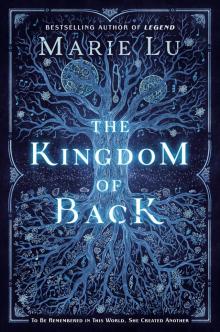 The Kingdom of Back
The Kingdom of Back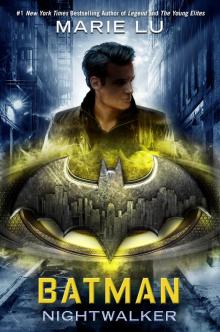 Batman
Batman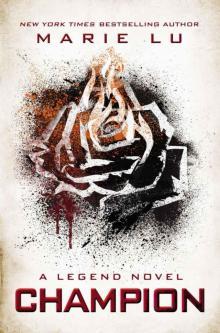 Champion: A Legend Novel
Champion: A Legend Novel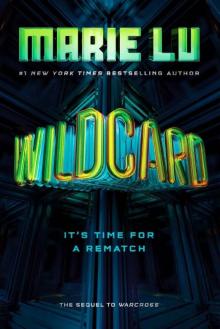 Wildcard (Warcross)
Wildcard (Warcross)